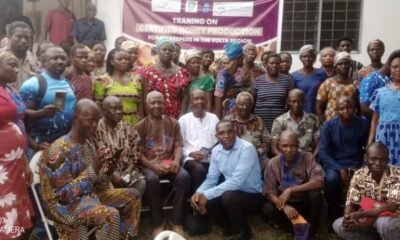Editorial
The traders are back again
Dear Editor,
About three months ago, I wrote to commend the Korle Klottey Municipal Assembly (KOKMA) for bringing sanity to the Kwame Nkrumah Interchange when it re-demarcated the area and ‘pushed’ the traders back to the market.
But it appears the good initiative is not achieving its objective after all. I have been using the stretch lately and still have to ‘squeeze’ myself through the crowd that has returned to the pavement.
I find it hard to understand why some of the traders fail to comply with simple directives until authorities are compelled to apply some level of force.
It is true that times are hard and people have to work hard to survive but we have been told that businesses on the pavement do not serve the best interest of traders and the pedestrians, hence the need for them to operate at designated spaces.
The emerging chaos at the interchange may get out of hand if the KOKMA re-moblises its taskforce once again to enforce law and order.
Lucy Quist,
Adabraka.
Editorial
To all Muslims, happy Eid ul Adha!
Muslims in Ghana joined the world yesterday to observe the Eid-ul-Adha; the second of the two main festivals in Islam.
Eid-ul-Adha takes place on the 10th of Dhu al-Hijja, the twelfth and last month of the Islamic calendar, and is also referred to as the “Festival of the Sacrifice.”
It symbolises Prophet Ibrahim’s (Abraham’s) readiness to offer his son as a sacrifice in response to Allah’s instruction.
In addition to making sacrifices, the celebration aims to spread unity, love, joy, and compassion.
In Ghana, people celebrated the day with special prayers, feasts, and the customary killing of an animal and sharing the flesh with their loved ones, neighbours, and the underprivileged.
During the celebration of the festival Muslims gather at mosques or open areas for congregational prayers early in the morning. After the prayers, people visit each other, exchange gifts, and enjoy festive meals.
One aspect of the celebration is the wearing of traditional Islamic clothing, such as kaftans, jalabiyas, and abayas, which are in high demand and cause prices to rise sharply during this time.
Abayas and jalabiyas, which are frequently imported from Turkey, Dubai, Egypt, and Northern Nigeria, have become very popular clothing items, leading to price increases, according to reports from our Northern Regional Correspondent.
“Some customers complain about the cost, but many still go ahead and buy because it’s Ramadan,” a store owner said.
However, as there is no set attire for the festival, many Muslims opted for modest, loose-fitting clothing that embodies Islamic principles.
The Spectator, believes that since the celebration is a wonderful occasion and Muslims want to feel happy throughout the festivities, the traditional attire should be reasonably priced so that others can celebrate in style.
We are glad that the holy month is still a precious time despite the economic strains, and that some people make the day extra special for their loved ones.
Despite the hectic preparations the emphasis should always be on appreciating the event’s profound spiritual meaning.
Happy Eid ul Adha to all Muslims.
Editorial
Review GTC’s ban on noise-making
Dear Editor,
I write to express my concerns regarding the annual ban on noise-making instituted by the Ga Traditional Council (GTC) and its impact on Christian churches and other religious institutions.
While I acknowledge and respect the cultural significance of this period for the Ga people, it is important to highlight the challenges it poses to churches within the Greater Accra Region.
The restrictions often affect worship services, prayer meetings, and other religious activities that rely on instruments and singing as core parts of worship. In some cases, churches are compelled to suspend midweek services or modify their mode of worship entirely.
It is important that cultural and religious practices coexist peacefully in a pluralistic society. Mutual respect and dialogue should be encouraged so that neither traditional authorities nor religious institutions felt marginalised.
I respectfully suggest that the Ga Traditional Council, in collaboration with the Christian Council and other faith-based groups, consider establishing clear, fair, and mutually agreeable guidelines that allow worship to continue in a way that respects traditional observances.
Peaceful coexistence is possible when there is open dialogue, understanding, and respect for all cultures and beliefs. Let us work together toward solutions that promote unity and harmony in our communities.
Eugene Ampiaw
Accra-Mamprobi







